#yes i know how did i not realize i was queer when my self-insert character was LITERALLY lesbian. i dont know okay
Text
Scott is groundbreaking alright, but not in the good way. As people have pointed out, the character of Scott McCall is nothing but a cheap power fantasy. Scott has no obligations or expectations of behavior put upon him: he can be mean and cruel to everyone around him, and his friends still continue to love him. Scott stans saw Scott, whom they claim is "superior" (except that he isn't), "abused" (except that he isn't), "feminine, neurodivergent and queer coded" (except that he isn't), a "genius" (except that he isn't) and a "good friend" (except that he isn't) and projected ALL their fantasies onto him. That's why the term Self Insert Stan with A Scott McCall Name Tag is extraordinarily accurate. Scott gaslights, belittles, dehumanizes, abuses and lashes out at his friends throughout the whole show; but instead of reaping the consequences of his own shitty actions and behavior, he is praised and rewarded with a 'True Alpha' title for it. No wonder antis like him so much
Okay, so this was an anonymous ask in two parts that I have put into one so that I can answer it all at once.
First of all, this isn’t strictly a question, but I can do a breakdown and an analysis of what’s being said, so let’s get into it. Here goes nothing.
--
“The character of Scott McCall is nothing but a cheap power fantasy.” -
Yes and no. I will agree that Scott started out as a potentially good character, but it felt less like a power fantasy at times because of the nice-guy trope that was also constantly being pushed alongside it.
They were trying to do two opposing things at once: a power fantasy and the nice guy wins in the end. Shoving these two tropes together makes a very unrealistic character, and puts the viewer into the headspace of an eleven-year-old boy.
“Superior, abused, feminine, neurodivergent, queer coded, genius, and good friend” -
I agree that none of these apply to him. He gained a superiority complex when he realized that he was a werewolf, which we see in how he started acting around his best friend and his rivals. Immediately ditching Stiles, letting Lydia kiss and use him to make Jackson jealous, and using his powers to beat up on him as well during lacrosse.
There was one incident of him being injured by his dad when he was a kid, and it was an accident.
I think they tried to make him feminine by having him be more emotional (his strong feelings for Allison/Kira/Malia), but that backfired and only made him look unhinged.
He is not even close to being neurodivergent, and I am speaking as someone with both ADHD and autism. He makes friends easily, focuses when he needs to, and can maintain relationships whenever he wants to--all of which are the opposite of clinical neurodivergence. (I know my sources, I will come at you if you try to fight me on this)
We never see him questioning his sexuality in the show, not once, whereas we have several moments where Stiles is questioning his own sexuality out loud, making Stiles the canonically queer coded character.
Genius? None of his plans were ever the good ones, even if they worked. When his plans did work, it was always at the expense of someone else who wasn’t even his enemy (e.g. forcing Derek to bite someone he didn’t want to).
And a good friend? He was a good friend for about the first episode of the show. He was willing to follow Stiles out to the woods--and that’s about as far as it went, with Stiles holding up their friendship for the rest of the show until Scott completely abandoned him when Theo came to town.
--
Okay, so we have established, through canon, that Scott is none of the above things. I now want to address why he is none of these things.
In Jeff Davis’ attempt to mimic a “chosen one” narrative, he forgot to do one very key thing: when you give your chosen one flaws, those flaws have to be a consistent stumbling block in their character. If your “chosen one” isn’t also learning from their mistakes, only avoiding all of their consequences by writing it as others suffering the consequences of the “chosen one’s” choices, then you have created a OP.
An OP is a character that is Over-Powered. You give them so much power, you have made any heroic plot line you give them practically meaningless. They can simply overpower their enemy through almost sheer force of will. I’ve mentioned this in a previous post, and I feel it bears mentioning again.
Scott McCall never learns from his mistakes because he never acknowledges them as mistakes... --Causing everyone else to suffer the consequences of his actions.
This is why he is an unbelievable character, but, unfortunately, a believable person.
I know men like him in real life. They genuinely think they are amazing and because no one else calls them out on it, they keep on believing it. It requires showing one face to your family, another to your friends, and yet another to your enemies. They get away with things because when people do call them out, no one else believes them because they’ve never seen that side of that person. It takes someone from the outside, or someone who is smart enough, who can see their full circle of influence to see their true nature.
This is why Derek and Stiles were so dangerous to Scott. They were the ones seeing the other sides of Scott that he didn’t want them to see.
A good example of this is when Stiles killed Donovan in self-defense and Scott abandoned his trust in him for the new beta, Theo, who had just arrived in town; the beta that was telling him exactly what he wanted to hear and was pandering to his ego with his black and white thinking. Stiles was explaining the bigger picture, the shades of gray that existed in the real world, and Scott immediately shut him down.
And this is why the nogitsune was one of the most dangerous threats that they ever faced: it could see all of Scott’s various faces because Stiles was seeing the whole board, and the nogitsune used it against him and everyone else.
I realize that this has been a long post, so I digress.
But there you go.
#teen wolf meta#teen wolf#scott mccall is a bad friend#scott mccall character discourse#npheq ask and answer#for anon
130 notes
·
View notes
Note
not an ask but your post on queerbaiting in response to @quillsandscreens 's post on gahan being headcanon hit the nail on the head! I don't really have a say in the convo bc im straight but my very straight ass could spot the queercoding from MILES away. I was so baffled when some others couldn't see it. It's all there, subtle but very intentionally framed. And had Gaon being a woman, the straights would've shipped the two to the ends of the earth without any change of script.
100% on point. so this is just me rambling here, but i tend to generalize in terms of straights just bc well, they're dominant and think everything is about them most of the time. so that's not to say everyone (like yourself) does not see the relationship within tdj. however, a good majority don't because they get to be blinded to all of the ways they are not negatively impacted by being queer. on top of that, if you're not within those circles of queer communities, there is so much context you miss out on, and that's a whole other level of overlooking.
underrepresented communities build specific context, discussions and language for each other to pick up on. (very poignant example of this is that is a little more mainstream is the fact that many women and their friends have no issue calling each other a bitch, regardless of whether it's out of love or not. but the minute a man calls a woman one.... nope. bc women understand the context in a non-threatening way. men, on the other hand, do not use that shit playfully and even if they try, it's uncomfortable).
so there is a lot of coding that happens with characters bc 1. there are rules/laws in place that prevent it being stated or could actually harm the crew/production/ability to get funded and 2. it's its own song and dance, the ability to create nuanced, subtle gestures and lines to show a character for who they are without uttering a singular word is absolutely incredibly bc of those limitations.
hets are so used to things being explicitly stated. they've never had to read between the lines. it's always handed to them, so no wonder that skillset isn't sharpened. they're under the impression that if it isn't said word for word, it must not exist and the intention was never there to begin with. but it's all about overtones (look at the stuff going down with venom right now and fans vs critics, which tells you a lot).
at the end of the day, people will see what they want to see, and they will fail to ignore context clues in favor of their own biases. and there are those even with queer characters and fans, yes. reading to much into things and stretching out things for a smidge of representation, but the difference there is that we are never given that to begin with. we've always had to find representation, and so that became the code of conduct, especially in conservative societies that are still battling queer rights.
you're absolutely right that if gaon had been a woman, everyone would've eaten it up. i'm still surprised tdj is still as popular as it is, but i know that it'd be significantly moreso if there was straight scenes involved. but thank god we weren't given more bc the entitlement and downright nasty behavior hets displayed with the gaon/soohyun scenes before they all realized she died...... i will never forget that. literally i will never forget how fucking curl and nasty they were because they couldn't let ONE show be for the gays. and the only reason for that is mainly bc of jinyoung and their obsessive need to be a self-insert with their kpop favs.
on top of that, they really did love the gaslight the entire fandom, even here on tumblr, about how wrong we were, how we turn everything gay, and we're misogynistic bc they couldn't take a damn minute to read/find analysis posts. like, i'm genuinely tired of straight people having the monopoly on what they think is right/wrong, and using misogyny and other social justice issues to call us crazy/delusional. maybe if we had openly queer tv and films for us to enjoy, we wouldn't feel the need to create and find context in the content we love and consume.
and just to reiterate in general, not pointing figures at you anon, tdj is NOT queerbaiting. it's queercoding, and fandom really needs to learn the difference.
37 notes
·
View notes
Note
Two cents from a female cis-het passing queer person who grew up in a deeply compulsory heterosexual environment. Media and mainstream het culture socialises girls and women to identify so much deeply problematic and violent male behaviour as perfectly normal, romantic behaviour. Prime example, Spike and Buffy. imo this is heavily reflected in the mlm slash ships that straight people love to fetishize, prime example St*r*k. When I discovered they were a ship it made me really sad.
Oh, you're preaching to the choir.
That was a pattern I picked up on years ago, one that I actually had to look for, because as a guy, I was told that it was okay to behave like the men we saw on television. Well... half told. My grandmother always told me to be nice first, because if you start off by being an asshole, no one's ever going to think your anything but an asshole. I also realized all on my own that maybe I should just care about other people, but that's just me.
The thing that really gets me about this phenomenon is that it's on here. Naturally, I don't expect Tumblr to be completely absent of this, but come on! This is Tumblr! You could throw a stick and hit a post about how men shouldn't treat women like that, or how women shouldn't put up with it, but then those very same people turn around and make apology posts for Kylo Ben, or Snape, or Damon Salvatore or Klaus Mikaelson or Spike. Oh, god, Spike! That whole "romance" (see: obsession) between the two just blew my mind, even back when the show was airing (yes, I'm old enough to remember when it aired on the WB and then UPN).
The fact that anyone can look at the intersections between Buffy and Spike and call that a romance disgusts me. And that's without even including the attempted rape. Just his obsession with her since the fourth season and how that spiraled into everything. That show really should have just ended at season five.
Spike is actually the earliest example that I've seen of a fandom loving a villain so much that the production decides to keep bringing them back. Except, you can't keep them around as the villain (y'know, the version of the character that everyone fell in love with), because it eventually gets to the point of "why can't the heroes beat the villain?" Simple, we'll give them a Tragic Backstory™, have them make the sad puppy eyes, and bam! We got us an antihero.
And people just eat that shit up.
It happened with both Damon and Klaus on The Vampire Diaries and The Originals. We have two characters who are introduced as these outright villains, killing people for their own amusement or to prove a point, but fans loved them so much that they got turned into antiheroes and all their bad deeds forgiven. I mean, its outright nauseating to see the way Damon treated Elena throughout the run of the show, invading her personal space, trying to compel her into kissing him, manhandling her, taking her choices away, and fans calling that love. Same with Klaus, who repeatedly threatened Caroline, actually tried to kill her (twice!), and Kl*r*line shippers thing that's the peak of romantic behavior because Klaus makes the sad puppy eyes. (See also: Theo from Teen Wolf)
And don't even get me started on the fandom fixation on Bonkai!
It all stems down to this weird phenomenon where one of the two characters is a self-insert for the reader/viewer, because they want to bang the male character/actor. That's why Rey is usually written so one-dimensional in R*ylo fics, because the reader is thirsty for Adam Driver. And that, of course, just leads us back to Teen Wolf and St*r*k. Although, that one's a little tricky, because you'd think that so many of these St*r*k shippers would insert themselves into Stiles (which there are a fair share that do), but more often than not, Derek acts as the self-insert, because most of the fans want to bang Dylan O'Brien. Seriously, I will never understand fandom's fascination with white twinks, but it's an all-encompassing thing.
Part of me understands because I'm old enough to remember the early years of internet fandom. Okay, I was there for FF.net before the purges. I remember Anne Rice's militant legal campaign against her own fans. I remember when the BNFs started gatekeeping, harassing the self-insert OCs in fanfic. Hell, I remember Ms. Scribe and the Inner Circle! I have seen things! And that crackdown against OCs was what led to the rise of fangirls in the slash fandom. Equal parts hiding from the BNFs and fetishizing mlm sexuality for their own amusement/pleasure.
The thing that really baffles me about it all is why St*r*I. Ignoring the obvious reasons (*cough*racism*cough*), why them. As I already pointed out, Tumblr loves their posts about self worth and not standing for abuse, but then turn around and advocate for one of the most abusive crack ships I've ever seen. Why not, say, Scott and Danny, who had actual moments that, if taken out of context, could be portrayed as moments of a building romance ("its Armani"), or Scott and Isaac ("Be careful"/"I don't want you to get hurt" and "Dude, I love Mexican"). Like, the subtext between Scott and Isaac was so strong that one could just call it text.
We had four canonically gay characters (Danny, Ethan, Mason and Corey) and yet the focus is still on two straight characters. Hell, Mason was literally the version of Stiles that fandom cooked up (incredibly smart, did the research, openly gay, had a crush on a hot werewolf that he was very open about) and yet he doesn't get even a fraction of the attention that Stiles does, despite fulfilling the criteria they claim they want in the form of more queer representation. It can't be because he's black, right? I mean, they've told me they're not racist, despite numerous examples of racism, so it's hard to know what to believe (insert sarcasm here).
But still, fandom put these two characters that couldn't stand each other, and who both had much stronger connections to Scott, together in their heads and then cried queerbaiting when they didn't get what they wanted. There comes a point where you have to question whether these people are that influenced by media and propaganda or they're being willfully ignorant.
Anyway, thanks for listening. Apparently I had more of that bottle up inside than I thought so thanks for giving me an outlet to express my frustration. And now, back to your regularly scheduled blogging.
#ask and ye shall recieve#fandom racism#fandom nonsense#anti sterek#anti reylo#anti klaroline#anti delena#anti bonkai#anti spuffy#teen wolf fandom problems
19 notes
·
View notes
Text
Tumblr once again fails at providing useful tools for ongoing conversations. Replying to @faejilly’s reply to my reply to her post last night, but I don’t want to deal with the clunky and limited reply interface for a post that has ended up veering wildly from the initial topic.
Also this gets pretty deep and may delve into some some TMI about sexuality and/or disturbing discussion, so I need to put it under a cut.
@maleccrazedauthor replied to your post “You know It is entirely possible trouble with the fic I cannot finish…”
Well, I am pretty sure the reason I can’t smut anymore is because I’ve been feeling ExtraAce™ for the past few years, so this seems perfectly fair to me.
There is a little bit of that too. Girls are Pretty & Sexual Attraction is Weird and I think I just want to write cuddles?
but AT THE SAME TIME I am still really into the ways you can look at character relationships and character development via the sex they are having and The Feelings Involved (and malec has lots of feelings)
also I am interested in the longing/build-up part before the sex and am not sure at which point I could switch from “I am aware of every single twitch of your fingers” to “but we’re totes gonna skim this bit of actual intercourse”
AND I keep having these really good ideas that I only know how to execute via sex so I try to write them and then I get to the sex part and stop and go hmmm. Like. I don’t really care about their dicks. And people who have dicks and are into sex, which are both assumptions I am making in my characterizations of Magnus & Alec, care about their dicks. In my experience.
I totally get so much of this. I think for me, the fact that I can’t smut (and particularly can’t smut about Malec) anymore is the fact that I’ve come to a place where I’ve already done the character/feelings-exploration-via-sex thing and now I’m just really all about the character/feelings outside of sex.
Like, back around 2010-2012 when I was writing at lot of Dragon Age fic and first exploring writing fic with queer characters, I was writing ALL THE SMUT. But a lot of that fic was really actually character exploration fic, rather than smut for the sake of titillation. It’s hard to tell the difference because it looks the same on the surface, but what really drove my storytelling up until about 2015 was this approach of putting the characters in a sexual situation that would challenge who they were or what they thought about themselves, and then just...see what happened.
What I didn’t realize at the time was that I was really exploring my own relationship with my sexual and romantic orientation, particularly that I was asexual and that I could and did have romantic and aesthetic attraction to women/trans feminine people as well as men.
And a lot of what drove the darker material I wrote during that time was processing the sometimes traumatic experiences that happened along that journey to reach that understanding.
For instance, in recent weeks, I’ve ended my relationship with my publisher due to the scandals they’ve been plagued with, and I’m faced with the prospect of re-launching my books as self-pubs. Part of the relaunch process is probably going to be doing some PR and discussing those book, so I’ve sort of had to look at my books and where they came from at the time I wrote them and what I was saying with them. And since my book that has sold the best (the one it makes sense to re-release first) is also the most controversial, I have particularly had to think about that one.
I wrote Strain in 2012, and I wrote the Dragon Age fanfic whose premise inspired the premise of Strain earlier that same year, so really I wrote those stories when I was just starting to understand that asexuality was a thing and yeah, it really could apply to me.
Which was, frankly, a horrifying realization because of all I had done in the 15 years prior to that to “fix” myself of my “low libido.”
(potential trigger warnings apply from this point forward, proceed with caution)
Back between, oh, 1998 and 2001, before any understanding of asexuality as a concept had reached my personal neck of the internet woods, I was actually in therapy for this issue. Part of that therapy included certain “homework” assignments. Even though I really wanted nothing to do with sex, I was supposed to “explore” what felt good, by myself or with my partner, to basically find what would jumpstart my arousal even when I wasn’t in the mood. Under the logic, I guess, that if repeated experience showed that sex felt good, eventually I would start to want it.
(insert clumsy “have you ever tried...not being asexual?” joke here.)
It was awful. To make it very clear to the person who is supposed to help you that “no, masturbation really does nothing for me; it bores me and literally I’d rather do anything else”, and “no, my skin crawls when I’m touched in a way that suggests sex may be on the menu, even when that sex eventually turns out to feel good” and then to have them basically advise you to...suck it up and do it anyway, even if you hate it, even if you don’t feel like it?
With today’s sensibilities, it’s easy to see how harmful this sort of “advice” is. Back then, though? That thinking was pretty much just considered common sense.
Fast forward another decade, around the time that I’m starting to understand why that never worked, and suddenly I’m writing stories where the protagonist is compelled into sexual situations that make them exceptionally uncomfortable “for their own good” and in the end don’t really fix anything, anyway.
Gee, I wonder where those stories came from?
But I’ve gotten far afield here. Back to Malec. And their dicks.
Being involved in Malec fandom has been interesting on that front because yes, they’re a sexually involved couple and I love them desperately even though, as you say, I have no interest in writing (and very little interest in reading, though the right author can hook me in enough to go with it) about their dicks.
And I worry about whether I’m doing an adequate job of conveying who they are as a pair if I’m constantly fading to black on their sex. Because sometimes who a person is in bed, what they want, how they react, it is a reflection of who they are outside of bed. And sometimes who a person is in bed is a person who is never seen outside of bed, because they’re laying it all bare, metaphorically as well as physically. The masks are off in a way they they might not be outside of that situation.
So it’s an important and valid arena for character exploration. It’s just apparently not one I can enter right now.
TL;DR I feel your pain, because I’m sort of dealing with the same issues in my handling of them.
#personal#sort of#not tagging this#i'm sorry jilly#i don't know where this ramble came from#i just suddenly needed to spill all this#also wtf is with the apostrophes#why are they appearing like that when they're fine in the editing window?#long post
11 notes
·
View notes
Text
Revolutionary Girl Utena Episode 3 Liveblog
Join me this week for episode 3: social anxiety, heteronormativity, authenticity, and schools with way too much goddamned money for their own good.
This one starts again with the fairytale framework, which was missing in episode 2. I’m making a note of this because I’m going to keep track of which episodes have this opening and if there are any similarities between them. inb4 ‘this is the episode where Nanami is introduced and that’s why there’s the fairytale since her episodes tend to have that opening
For this episode, I think it’s a combination of things. One is the somewhat obvious answer that we, as an audience, need to be reminded of this backstory. I think that it also speaks to the themes of this episode, though, in reminding us that Utena’s goal is to become a prince. Of course, as we come to find out, both the flashback and the goal of becoming a prince are false ideals, and the brilliance of this show (as I keep saying) is that it outright tells you this from the start, but in a way that makes you want to take it at face value. We will keep this idea in mind throughout this episode -- everything is precariously constructed, there’s a lot going on behind what we actually see, but we’re cued to take it all so earnestly, at face value.
And here we introduce one of Utena’s major concerns for the first arc: Anthy has no friends! We should give her some friends!
On the questions raised last liveblog about whether to take Chu-chu at face value or not, I think that we should take Anthy’s assertion here fairly literally, and this is one of the few times that I think I’m going to advocate taking anything in this show literally. I think that Chu-chu is her friend.
This exchange is interesting to me
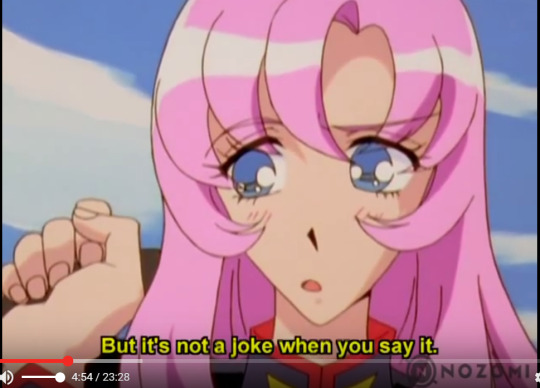
Utena asks Anthy to stop calling her “Utena-sama,” and all of Utena’s fangirls call her that, but Utena writes it off as “a joke.” This scene seems to be calling attention to a weird sense of performance going on here. For the fangirls, it may be a joke on the surface level, but there seems to be something more authentic underneath that, especially considering that they all do it and that it seems to be a recurring thing. Oh, and Wakaba exists, of course. I’m not sure if this is Utena wanting to think that the probable actual thirst of the schoolgirls is a joke, or if it’s seen as a joke on all sides but they’re actually quite parched.
With Anthy, this seems almost inverted. Sure, she’s completely serious about being the Rose Bride. But she has no actual respect for Utena at this point, and while on the surface it may seem like she’s being deferential to her fiancee, deep down, she’s simply performing a surface-level role. It’s much more a “joke” to Anthy than it is to the fangirls.
(On a side note, my browser is flagging “fiancee” [the feminine form] as possibly incorrect spelling when I place “her” in front of it, but if I place “his” in front of it, it doesn’t. I get what it’s doing, but it’s still quite the heteronormative spell checker!)
Speaking of heteronormativity



Throughout this series, especially early on, “normal” and “heteronormative” seem to fully converge. Here, Utena wants to be seen as perfectly feminine (despite her clothing choice and fiancee) and as, more importantly, straight. To her, “normal” means “wants a boy rather than a girl.” Yes, there’s shades of “this whole dueling system is weird and I’d rather have a lover I met in an everyday way than someone I accidentally won in a duel” but I feel like the emphasis is placed on the gender of the love object here, and on Utena fitting into a model of heterosexual femininity.
Of course, no one believes her. At least, I don’t. The way to seem “normal” isn’t to parade around in a so-called “boys” uniform and declare your desire to be a prince. Her actions are seriously at odds with her words here.
And then this asshole shows up.
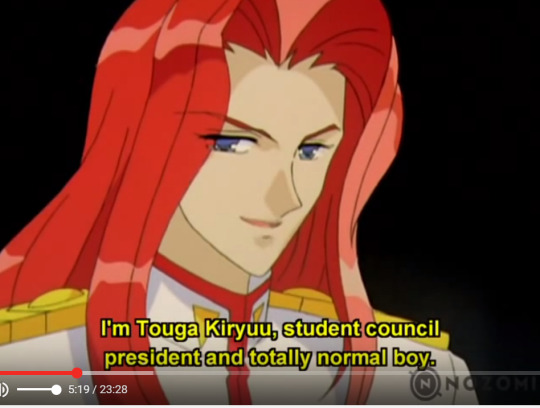
That hair says otherwise, Touga. That’s major character hair right there.

And Utena provides one of her better reaction faces at what has to be one of the worst pick-up lines in anime history.
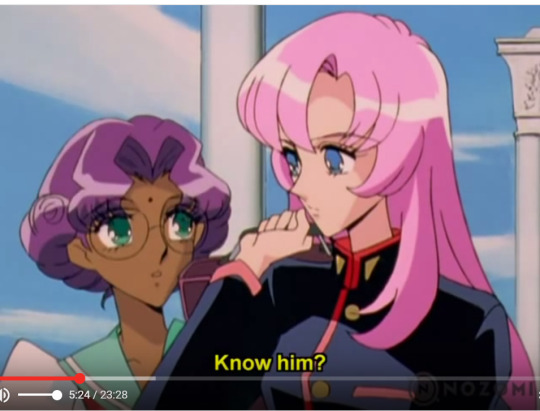
[insert joke about Anthy knowing him in the biblical sense]
(Though maybe that joke is more appropriate for the movie, where that’s actually a major plot point)
I wish I could edit out the snippet of video where Touga tries to play with Utena’s hair and she slaps him away and dramatic music plays. Everyone in this series is so extra and I love it.
Oh no! Touga is wearing the ring! We have to go from “this guy is a total fuckboy who deserves to be slapped” to “could this guy be my prince?????” in the span of a few seconds! I guess Utena being the most oblivious character ever is part of her charm, though...
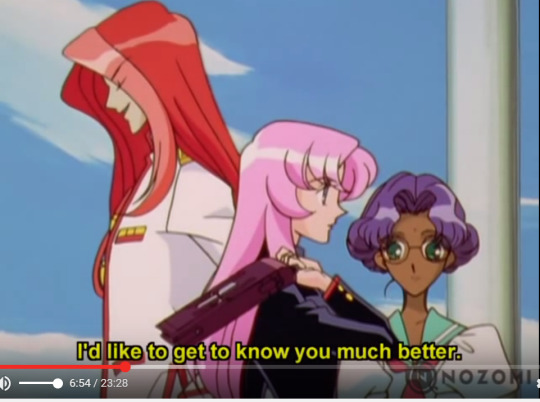
[insert joke about how Touga definitely means it in the biblical sense]
In this Student Council meeting, Miki uses the stopwatch almost right away, after Touga says that Saionji lost again. I think he’s timing when his own line should be. As per last episode, Saionji himself is still not present. Also still no weird antics at the meetings.
Anthy slap count: 3
For those participating in the drinking game ;]
So the latest Anthy rumors are about “what she did to a popular boy” (Saionji), which...middle school rumors often get things wrong, yes, but this is also the role of the Rose Bride. She’s taking on the blame for everything that went wrong, even if Saionji is the one who was an abusive asshole and is now being dramatic and refusing to leave his room.
This does make me think, though...do you know? do you know? Doesn’t that sound like the start of someone about to share some juicy gossip? I wonder how much of the Shadow Girls plays are basically the level of highly allegorical, surrealist rumor, and if we should take them as such?
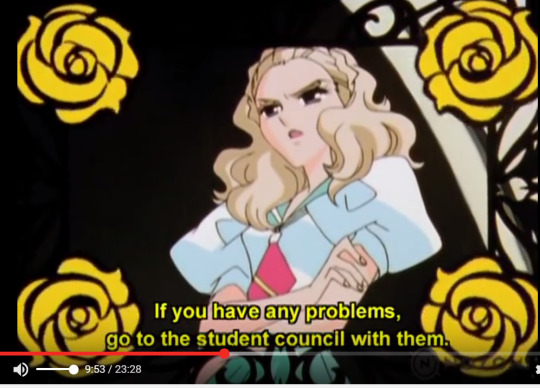
I am a firm believer in the idea that Nanami is the only other character in this series who has the potential to be a protagonist, only she’s the protagonist of the wrong show (that and she doesn’t interact with the system in the way that Utena does, which is what allows for Utena to make it to the end of the dueling game). (I never said these liveblogs were spoiler-free :P) I think that her introduction here is an indicator of that -- she’s introduced in much the same way as Utena is, only without quite as much pomp and circumstance to her unveiling. There’s a strong visual parallel here, though, and to my memory, the only other character to be given this type of introduction. That is, she’s given the slow tilt up her body, starting at her feet, with the spinning rose frame, much like Utena was. Other characters may have the rose frame, but not that same level of “self-important theme music and the slow reveal of the character” that Nanami is given here. (I know Juri has her very sad theme music mostly used in highly emotional moments, Anthy has theme music but she’s a more major character, Miki sorta has theme music but it’s mostly used in other places...do Touga and Saionji have theme music at all? Do any other side characters have theme music to the level of Nanami? Maybe Nemuro [not Mikage]? It seems as it it plays almost every time there’s something related to her on screen.)
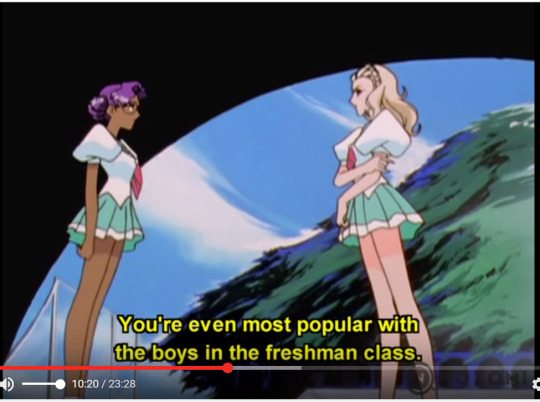
I always go to beat up girls I don’t like with the school’s Forbidden Forest™ in the background.
Actually, I wonder if this is some sort of really weird foreshadowing -- that’s where the dueling arena is, and this is pretty much a cropped (and daylight) version of the shot that opens the Shadow Girl plays for this arc. I’m probably reading too much into it and it’s just a nice, convenient location to get into fights at. You know. In front of the big, ominous forest that all schools have.
The editing and angles in the next scene are nice -- of /course/ Anthy is playing cards with Chu-chu and Utena is just sitting in the corner, stewing. Isn’t this how most friends spend their evenings?

That is exactly the reaction I have to all of the party dresses in this episode.
Utena insisting that Anthy go to the ball and make lots of friends is an interesting moment for me

There’s that fake Anthy smile we all know and love.
I can’t remember my first watchthrough of the series and how I reacted to this particular moment. I wonder how many first-time viewers (who don’t yet realize just how complicated Anthy is) take this response at face-value, and how many realize that Anthy is quite literally obeying orders here, even if Utena didn’t intend it as such?
This scene seems to really align us with Utena’s perspective, though, in wanting Anthy to go and make friends, and having us feel sorry for Anthy for being shy, not for...well, being the Rose Bride and having been abused and tortured her whole life. Utena is trying to make Anthy into that perfectly normal girl that she so desperately wants to be herself, and is coming at this from the perspective of having average problems, not highly symbolic magical problems.
The Shadow Girls play here is a bit obscure. On the surface, it’s about how the ball is just an excuse to catch a man, and how the girls are shameless for wanting to do so, and yet our actors move back and forth between playing the town gossips and actually participating themselves as the prince and princess archetypes. That all seems relatively straightforward -- words not lining up with actions, judging others but having the same desires (even if someone queered by the fact that the prince is one of the same actors as before), setting up what happens between Utena and Anthy as explicitly romantic.
But why are there two dogs? There’s one dog when the SGs are playing the town gossips, and then two dogs when they’re the prince/princess at the ball.
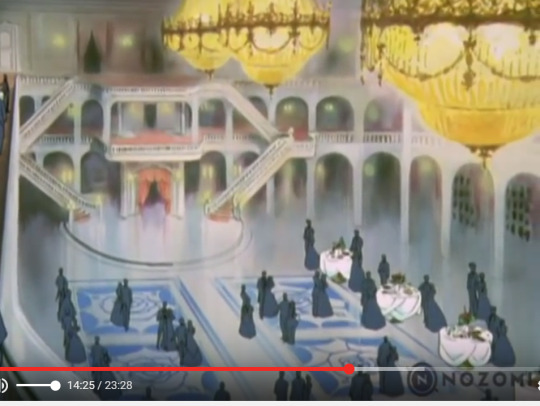
Another question of “just how rich is this school?”: they sure do seem to have a /lot/ of fancy dress parties. No industrial-looking cafeterias or gyms strewn with cheap steamers and girls in JCPenney dresses here. Nah, we have classical music and champagne. I bet the tuxedos the boys are wearing are ones that they own, not even rented.

On the point of the fangirls “joking” about calling her “Utena-sama”: clearly, they’re all /hella/ thirsty. I don’t think they’re joking as much as Utena wants to believe they are.

Yes, Utena. Yes it is.
Besides being one of the best visual representations of social anxiety I’ve ever seen,
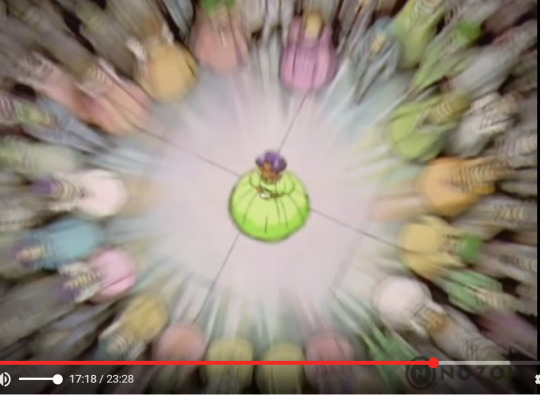

this is also something to keep in mind come episode 34. As we get more information about her backstory, this comes to be a surprisingly authentic reliving of trauma for Anthy, and not just a display of anxiety or shyness for its own sake.
I’m actually fascinated by these moments, since they seem to be one of the few places, especially this early on, where we are allowed to see something authentic from Anthy rather than the mask she wears. Of course, we don’t realize it yet. I wonder how much of this is her allowing the mask to come off for a bit, and how much is that her trauma is too difficult at this moment to keep hidden? She does a very good job of hiding it the rest of the time, so it’s interesting that we get this scene. Or is it simply a performance of trauma, and not authentic at all?
Back to shitposting: Yuuko is the only one in the entire goddamned episode who has a passable dress.
I’ve actually looked to see if there’s a fabric that dissolves in alcohol, and the closest I can find is a rare type of rayon that dissolves in a combination of alcohol and...something else, ether maybe? It’s been a while since I’ve looked it up. Still very impractical for a garment, and nothing is going to dissolve that quickly unless that dress was made of rice paper or something.
Though, it’s mostly to give Utena an excuse to act the Prince and save her girlfriend from being humiliated and naked in front of a bunch of strangers.
I love these kinds of early series pranks, though. I feel like as we get further into the series, the whole thing becomes almost like a giant prank somehow (the cars. the cacti. the severe shortage of men wearing shirts.), but all of the problems are very serious and heavy, so it’s interesting to see the early episodes seem to take themselves so seriously and yet all of the problems are things like “someone spilled wine on someone at a party.”

I would do the [insert obligatory joke about how she was wearing the uniform underneath that dress somehow], but that’s not actually what happened here. She’s not in her school uniform. She had her magical girl transformation.
Of course, this is to visually set up the idea that she’s acting as the prince here. But it begs the question: whose powers cause her transformation to happen? Does this solve the mystery of why only Utena seems to get a transformation, no matter who is in possession of the Rose Bride, if those powers are somehow inherent to Utena, not to Anthy? And if so, what would that mean for the framework of the show?

Cosplay goals: make the tablecloth dress actually out of a tablecloth. Is it possible? No. But I can try.
Actually, the quick change seems to be another magical girl transformation, rather than an actual outfit. ~Suspension of disbelief~ is overrated.
And our main ship is established. Now, for the delicately constructed life of these two to come crumbling down over the course of the next 35 episodes once we learn more.
That concludes this week’s liveblog! Congrats if you made it to the end, as usual. Next Sunday (July 2nd) is the scheduled date for our next liveblog.
A quick closing note, since I never actually talk about the next episode bits unless they’re somehow important -- it seems significant that Utena mentions that Miki has only fought one duel before this, but I can discuss that next week. Or, probably, the week after.
#not blog themed#revolutionary girl utena#utena liveblog#utena analysis#long post is long#there's not terribly much serious to say about this episode#but i do try#it's at least 75% shitposting this week though#but there's a few good questions raised
20 notes
·
View notes
Text
Genderbending Robin Hood Adventure Marian Flies True
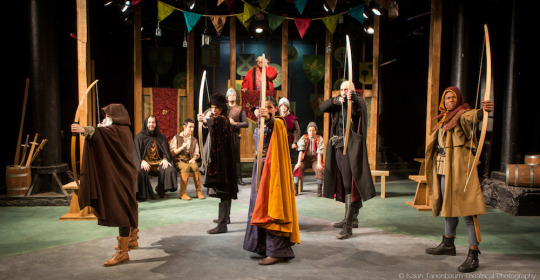
While Robin Hood tales have run the gamut from swashbuckling adventure to serious romantic drama to winking parody to dancing foxes, a few constants remain as true as Robin’s shaft-splitting arrow: Robin Hood, master of both archery and disguise, leads his band of Merry Men to rob from the rich and give to the poor. But what if the real treasure that Robin loots from the privileged (that is, men) is opportunity and agency for everyone else (women and gender-nonconforming people)?
Oh, and Robin Hood was Maid Marian the entire time. It’s the kind of delightful twist that could have been the climax of another tale, but playwright Adam Szymkowicz makes it nearly the opening line of Marian, or the True Tale of Robin Hood. And suddenly, just like the anthropomorphic residents of Disney’s Sherwood Forest or the bellowing refrains of “Men in Tights” from Mel Brooks, a new lens is put into place, through which to reevaluate the familiar trappings of this archetypal tale.
Not that Flux Theatre Ensemble’s charming production disregards those familiar trappings: Will Lowry’s set places the audience in the middle of the action as if they had wandered into a Renaissance faire or made a reservation at Medieval Times; the pennants extending into the intimate seating at the New Ohio Theatre has a positively transporting effect. With Lowry having set the stage, Kelly O’Donnell’s excellent direction populates it with the players, their revolving door of entrances and exits the stuff of French farce.
Truth be told, the Robin Hood story is pretty formulaic: rob from the rich and give to the poor, win the archery contest, free the girl, humiliate Prince John. However, Marian brings new dimension to these beats: When lady archer Alanna Dale (Jessica Angleskahn) discovers Robin’s (Becky Byers) true identity as Marian, the rogue invites the lady to stuff her hair under a hat, dress in men’s clothes, and join the Merry Men hiding out in Sherwood Forest… where she promptly falls in love with Will Scarlett (T. Thompson) somewhere between their first sparring and first sentry shift.
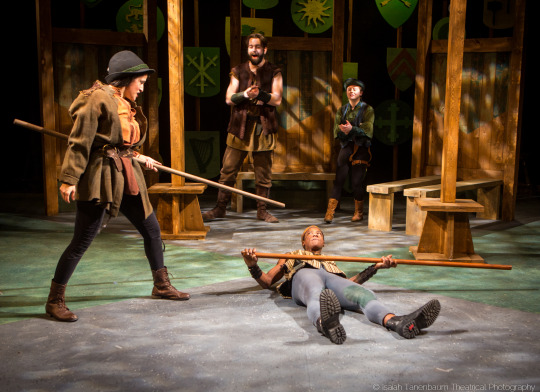
Alanna’s initiation into the Merry Men is the tipping point to reveal that most of the Merry Men aren’t actually men, and that there are more than a few arrow-crossed lovers in the ranks. Maid Marian’s capture later in the play is almost secondary to all of the romantic dramas and identity conflicts unfolding; even the guards have affairs! With all of these secretive trysts and constant donning and doffing of disguises, Marian is less Robin Hood retelling than medieval sex farce, with couples snatching brief tête-à-têtes, on constant alert for a guard or Prince John or another Merry Man to walk in on them.
Which is not to say that makeouts are the only action: Marian boasts a number of balletic fight scenes (choreographed by Rocío Mendez) that highlight the bulk or grace of the respective fighters. In addition to these personal touches, there are some truly creative choices with regard to perspective, especially one sequence that involves scaling the castle wall. And I gasped every time an arrow came out of nowhere—that little detail really made me feel as if I were in a Robin Hood adventure.
An amusing aspect that this version retains is the famous romance between Robin and Marian, made even more hilarious by the fact that this “power couple” can never actually be seen in the same room together. Now that’s the kind of Noises Off shenanigans it would have been great to see. Though it’s worth pointing out that the double-casting of Mike Mihm as both Friar Tuck and the Sheriff of Nottingham achieves some of that winking humor: Both are lovers to lady-in-waiting Shirley (Nandita Shenoy), though it’s clear that she’s more smitten with the good Friar. The latter’s pillow talk is one of the play’s surprisingly deep moments, as they discuss the relative sinfulness of greed when it’s not coveting someone else’s possessions but simply wanting better for your own life.
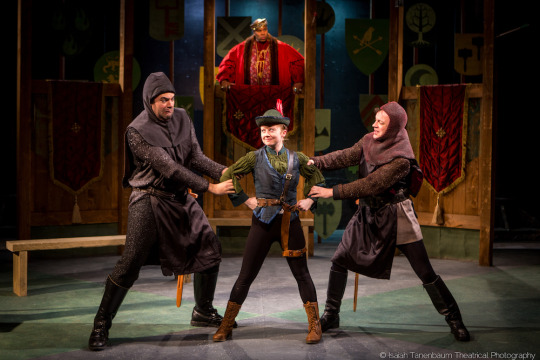
It’s the kind of existential dilemma that Marian could weigh in on, but strangely, we never find out the why behind this genderbending plot twist: Did Marian dream up the Robin Hood persona, or was it bequeathed upon her, à la the Dread Pirate Roberts? How does she account for feminine inconveniences such as her period or the need for hair upkeep? Surely the Merry Men would notice if there were soiled sanitary napkins piling up around camp every month, or extra hairpins and chest bindings lying around. Did she decide to lead a double life because of shortcomings in her life as Marian; if so, why live half of her time as a noblewoman courting Prince John’s affections? Access, most likely, though we only get to see the tail end of one heist that she’s masterminded.
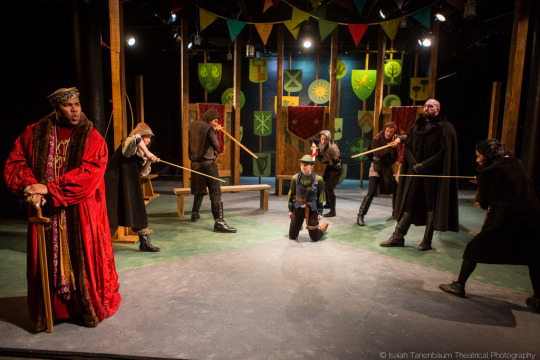
Perhaps my favorite facet of Marian’s character is her reverse-psychology utilization of “feminine wiles”: Whenever Prince John starts getting too handsy, she starts sweetly talking about her period, which has him twisting in revulsion even before she’s gotten into the nitty-gritty. All she has to do is remind this germaphobe prince about the not-so-fun parts of her genitals, and he’s lost any boner. As Prince John, Kevin R. Free is an absolute delight. Yes, he embodies the bumbling ruler through campy sashays and ridiculous cooing to a fake carrier pigeon. But for every shrill order there’s the converse, as he shifts into menacing by dropping an octave and pulling himself up to his full height, reminding you—oh shit, this is the man in charge, we’re in trouble.
Our own lack of access to Marian is somewhat mollified by Alanna frequently stepping outside of the narrative to deliver a running commentary on the action—a framing device that I found at times charming (“I don’t know this yet”) and other times excessive (considering the frequency with which she interrupted the action). As we’ve just learned that Robin isn’t who we thought he was, taking another step away from the archetypal character naturally loses some of the intimacy I was craving. Yet at the same time, it’s wonderful to see that Marian is the rule rather than the exception, to meet other women who possess the same pluck and spine. But Alanna is no mere audience insert; as a(nother!) slyly genderbent take on the minstrel Alan-a-Dale, who pops up in many a classic Robin Hood tale, she ably fulfills the duties of her predecessor.
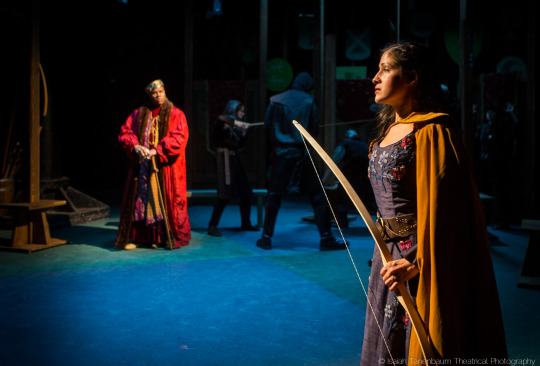
Further, Alanna’s perspective—bookending moments with “This is my [concerned/in love/etc.] face”—taps into one of the play’s central themes: the duality of self. Prince John allows no one but concubines access to him in his most private moments. Shirley has the same “define the relationship” conversation with both of her paramours, down to the word, but the inflection couldn’t be more different. Just as he hides his sensitivity with brashness, Will Scarlett has a very specific persona he wants the world to see, genitals be damned. Little John (played to perfect sweet dumbness by Jack Horton Gilbert) reconciles his crush on Marian with his love and loyalty for his best friend Robin. Alanna knows that the face she turns toward the world is not reflective of what’s going on inside her head.
It’s a credit to Szymkowicz that Marian isn’t the only character struggling with two selves, but Becky Byers embodies that push-and-pull with aplomb. I’ve seen her age ten years in a day (in Mac Rogers’ The Honeycomb Trilogy), so I was delighted by the perfect casting. Though her chipper Robin, dressed in all green, sometimes leans more Peter Pan, further consideration has made me realize that it’s just a new take on the famous Robin Hood aloofness that makes him so inspiring but also so frustrating. Even when he’s giving so much in terms of riches, he gives away little of himself. Unfortunately, Marian is drawn less clearly; she invokes the same cheery deflection with Prince John, but we know little of her private self… except for one telling line, in a moment of somber self-analysis: “Some of us have to have less so all of us can have more.”
What Marian lacks in nuance, she makes up for as Robin Hood the figurehead, granting permission to everyone else to express their truest desires. The casting of mostly female and trans actors in the Merry Men brings to mind Jaclyn Backhaus’ Men On Boats, but in this case, the play explicitly addresses the queering of traditional notions of gender. The most touching example is that of Much the Miller’s Son (C. Bain), who confesses to the rest of the Merry Men that they don’t feel much like a man—or a woman, for that matter. They request that the name of the group be adjusted to account for not just cisgender men or women in drag (though, hilariously, no one actually knows about the women in their midst), and though no one actually understands why Much made this request, they don’t deny it. Bain’s part is small, but he imbues it with such gravity and earnestness that Much’s desires become intensely relatable.

With a 90-minute running time, Marian both moves too quickly in parts and drags in others, as the story seems designed to fit the timing instead of the other way around. We cover so much ground, with an ending that felt far too rushed in its attempts to both achieve closure but keep the myth going, that the overall effect of this particular story is lessened. In truth, Marian would make an amazing pilot of sorts, the first volume in an ongoing saga. I would love to see it live on as an ongoing series, like The Brick’s monthly soap opera It’s Getting Tired, Mildred or The Flea’s weekly #serials. That way, we could take on the role of Robin Hood’s audience night after night and week after week—right where he wants us.
Marian, or the True Tale of Robin Hood runs through Saturday, February 11 at the New Ohio Theatre. Click here to purchase a Living Ticket!
1 note
·
View note